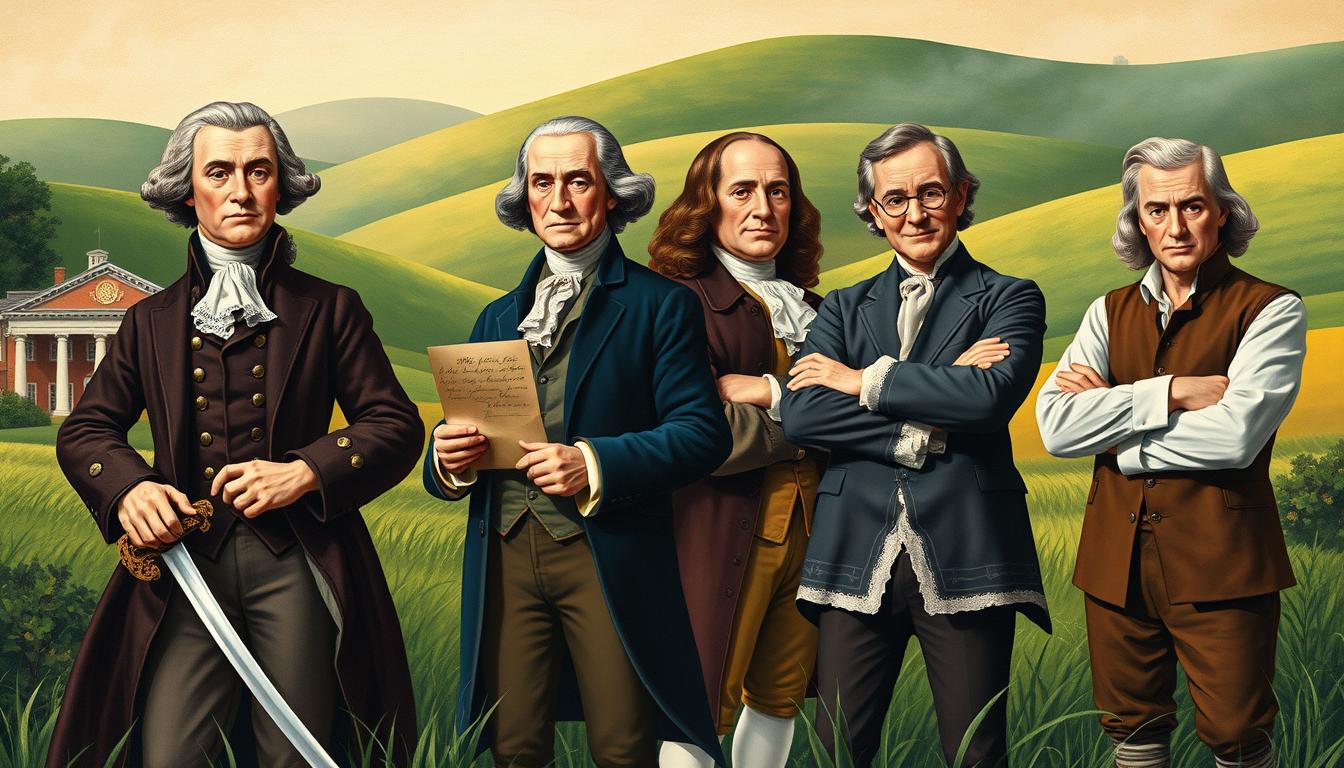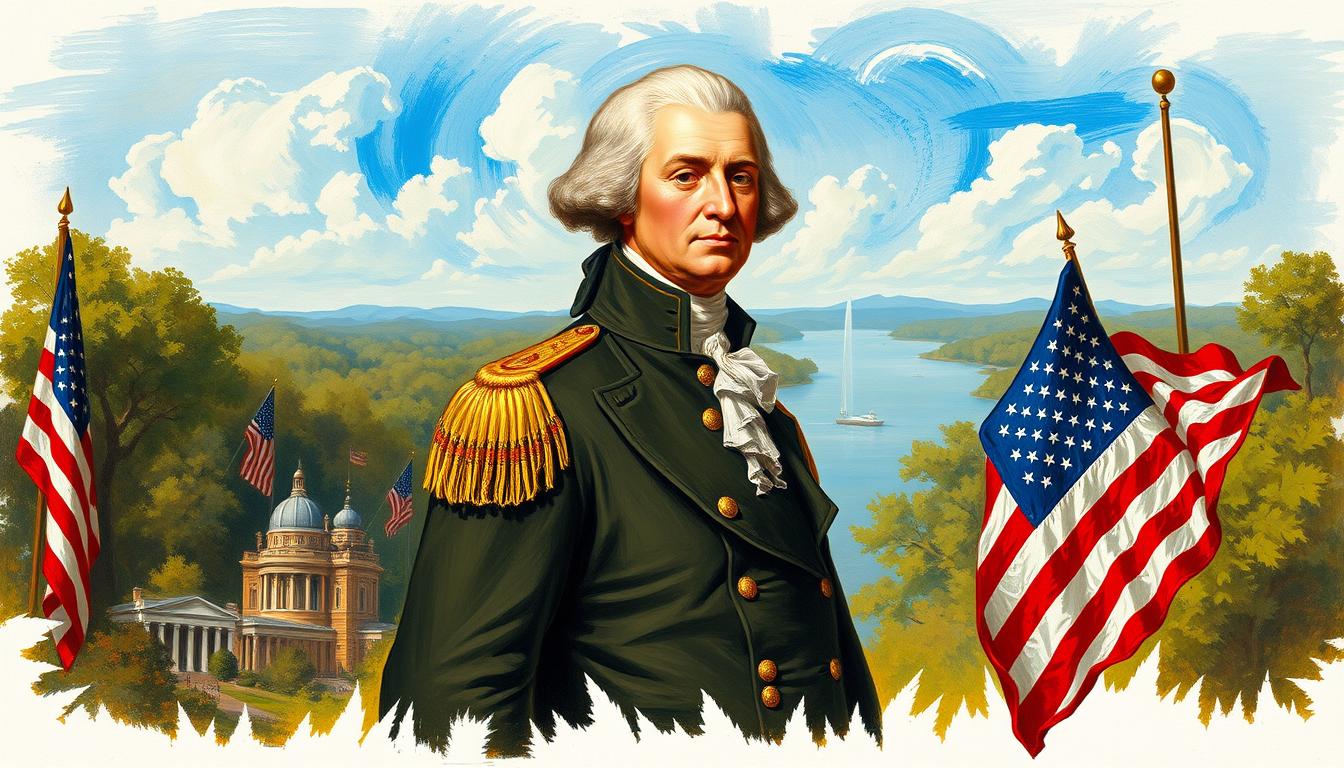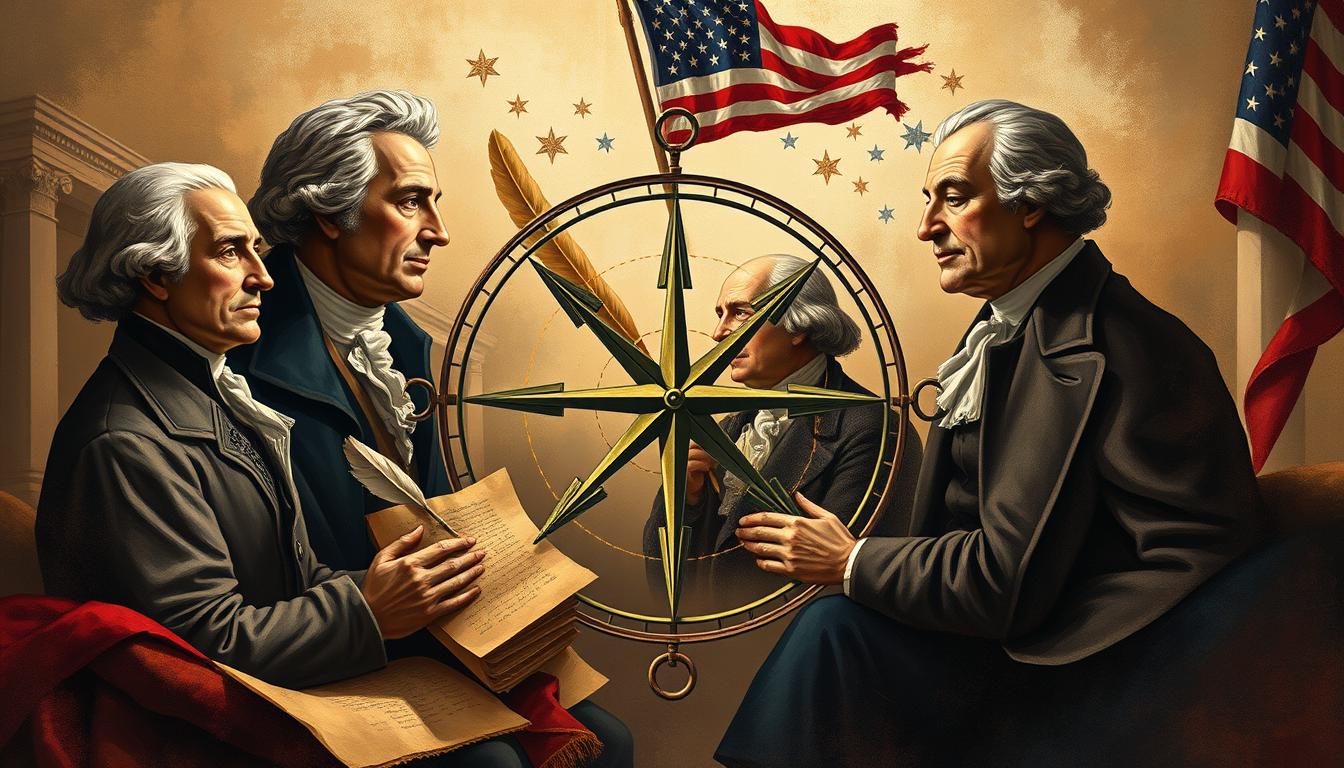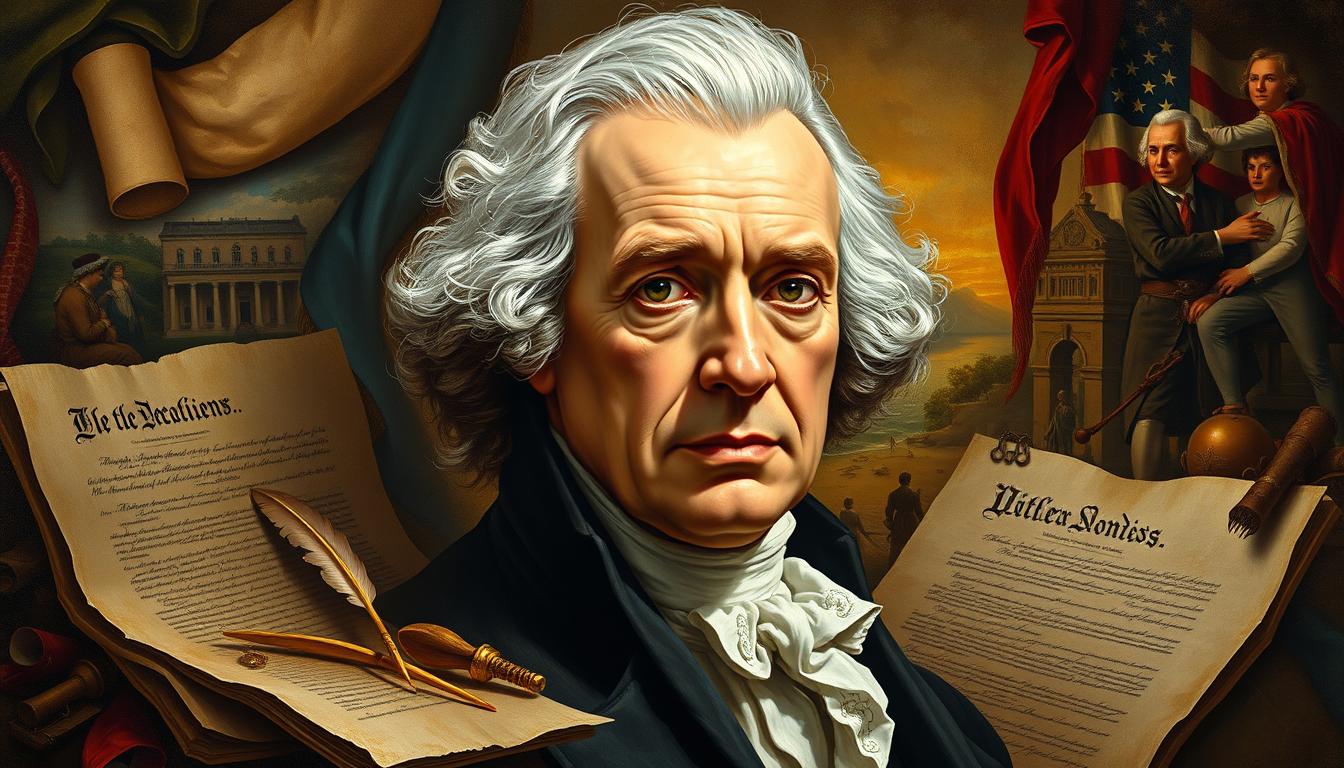Life and Legacy: Exploring the Roles of Washington, Jefferson, Franklin, and Adams

The Founding Fathers of the United States—George Washington, Thomas Jefferson, Benjamin Franklin, and John Adams—played pivotal roles in the American Revolution and the establishment of a new nation. Their collective contributions not only paved the way for independence, but their enduring legacies continue to shape American society today. This article delves into the significant historical impact of these remarkable individuals, highlighting their diverse philosophies and collaborative spirit as they navigated the challenges of governance in the fledgling republic. Through their lives, we discover lessons that resonate in our modern landscape.
Introduction to the Founding Fathers
The Founding Fathers of the United States played pivotal roles in shaping early American history. As revolutionary leaders, they emerged from diverse backgrounds, including military, philosophical, and diplomatic spheres. Each of these figures contributed unique perspectives that shaped the nation during its quest for independence.
Central to the Founding Fathers overview is their commitment to the principles of freedom and self-governance. Their actions laid the groundwork for the establishment of the United States as an independent nation, fostering a democratic ethos that would influence generations to come.
These leaders faced numerous challenges in their fight for United States independence, often engaging in fierce debates about the future governance of the new country. Their collective experiences during the revolutionary era informed their visions for a system that balanced authority with individual liberties.
| Name | Background | Contribution |
|---|---|---|
| George Washington | Military Leader | Commanded the Continental Army |
| Thomas Jefferson | Philosopher | Drafted the Declaration of Independence |
| Benjamin Franklin | Diplomat | Secured French support during the Revolution |
| John Adams | Lawyer | Pushed for independence and helped draft key documents |
Understanding the roles of these revolutionary leaders helps contextualize their historical significance and the impact they had on the framing of American governance.
The Life of George Washington
George Washington, the first president of the United States, has a compelling biography that begins in Virginia where he was raised. His early experiences shaped his outlook on leadership and governance. Washington's initial forays into land surveying grounded him in the Virginia landscape, but it was his early military service that would ultimately define his career. The struggles of the French and Indian War tested his capabilities and honed his leadership style, preparing him for future challenges.
Early Life and Military Career
Born into a plantation family, Washington's upbringing revolved around the challenges and opportunities of 18th-century Virginia. His early military service began when he joined the Virginia militia, quickly rising through the ranks due to his determination and strategic insights. The French and Indian War played a significant role in his development, as he faced adversities that demanded both courage and tactical acumen. These lessons were invaluable as Washington later became the Commander-in-Chief of the Continental Army during the American Revolution.
Presidency and Legacy
The George Washington presidency occurred from 1789 to 1797, a pivotal time for the nascent nation. As the first president, his efforts established essential protocols for the new government. Washington championed national unity during an era fraught with division. His leadership style emphasized collaboration, seen in his formation of a Cabinet to advise him. Foreign policy challenges tested his administration as he navigated complex relationships with European powers. His decisions laid the groundwork for future governance and set lasting traditions, including the precedent of serving only two terms. Washington's legacy remains influential, inspiring leaders and citizens alike to prioritize the principles of unity and democracy.

The Life of Thomas Jefferson
Thomas Jefferson, a key architect of American democracy, played a fundamental role in shaping the nation’s core values through his advocacy for liberty and equality. His most notable achievement, the Thomas Jefferson Declaration of Independence, was drafted in 1776, anchoring the ideals of freedom and the pursuit of happiness firmly within the American ethos. Enlightenment influences permeated this document, reflecting Jefferson's philosophical commitment to human rights and rational thought, which laid the groundwork for a new nation's identity.
Drafting the Declaration of Independence
The crafting of the Declaration was a significant milestone in American history. Jefferson's eloquent articulation of democratic principles served not only as a formal statement of separation from British rule but also as an enduring symbol of American aspirations. The ideas embedded in this document—liberty, equality, and the social contract—continue to resonate within the fabric of American society, illuminating Jefferson’s profound impact on national values.
Presidency and Policy Innovations
During Thomas Jefferson’s presidency from 1801 to 1809, he initiated several pivotal policies that transformed the nation. One of the key events was the Louisiana Purchase in 1803, which significantly expanded U.S. territory and marked a turning point in American expansionism. Jefferson's vision for an agrarian America reflected his belief in the importance of an educated citizenry, leading to various education reforms that prioritized public schooling and established the University of Virginia.
These education reforms illustrated Jefferson's commitment to Enlightenment ideals, emphasizing the need for informed and engaged citizens in a thriving democracy. He believed that a well-educated populace was crucial for the preservation of liberty and democracy, reinforcing the core values he championed throughout his life.
| Event | Year | Significance |
|---|---|---|
| Drafting of the Declaration of Independence | 1776 | Established core values of liberty and equality |
| Louisiana Purchase | 1803 | Doubled the size of the U.S., promoting expansion |
| Founding of the University of Virginia | 1819 | Promoted public education and citizen engagement |
Exploring the Roles of Washington, Jefferson, Franklin, and Adams
The relationships among the Founding Fathers were shaped by both collaborative efforts and ideological conflicts. As they worked together to establish a new nation, their differing visions often created tension. The contrasts between Thomas Jefferson's ideals of agrarian democracy and Alexander Hamilton's advocacy for a robust industrial economy illustrate the deep ideological conflicts that characterized their interactions. This divergence not only influenced individual relationships but also played a vital role in the formation of early political parties, which helped to define the American political system.
Collaborations and Conflicts among Founding Fathers
The Founding Fathers relationships were crucial in shaping the trajectory of the nation. Notable collaborations, such as the drafting of the Constitution, highlighted their ability to find common ground. Yet, these partnerships frequently faced challenges. The struggle between Jefferson and Hamilton over the direction of the new government laid the groundwork for future political disputes. This ideological conflict emphasized differing views on governance and the balance of power, with each faction advocating for distinct governance models that continue to resonate in today's political climate.
Influences on Modern Governance
The Founding Fathers' impact today extends far beyond their lifetime. Their principles established foundational concepts such as checks and balances and civil rights, which remain pivotal in discussions of modern governance. The interplay of their philosophies demonstrates the enduring relevance of their contributions. The ongoing debates surrounding the American political system can be traced back to the innovations introduced by Washington, Jefferson, Franklin, and Adams. Their legacy remains a touchstone for contemporary politicians who grapple with similar issues of representation and governance.

The Life of Benjamin Franklin
Benjamin Franklin stands as a transformative figure in both science and diplomacy. Throughout his life, he demonstrated remarkable ingenuity, leading to a wealth of Benjamin Franklin inventions that have had a lasting impact on American society. His scientific contributions highlight the spirit of the Enlightenment, emphasizing reason and empirical inquiry. Additionally, Franklin's diplomatic achievements played a crucial role in shaping the early United States.
Contributions to Science and Invention
Franklin's legacy includes groundbreaking work in various fields, most notably his experiments with electricity. He famously conducted his kite experiment, proving that lightning is a form of electricity. This pivotal moment in scientific history enhanced understanding within the scientific community. His inventions, such as bifocal glasses and the Franklin stove, showcased his capacity for practical solutions to everyday problems. Franklin's work encouraged the pursuit of knowledge and innovation, leaving a lasting influence on future generations.
Diplomatic Achievements
In addition to his scientific endeavors, Franklin's role as a diplomat was paramount during the American Revolution. His efforts in securing the French alliance proved instrumental in providing the necessary support against British forces. Franklin's charm and negotiation skills helped foster this critical relationship, which ultimately influenced the outcome of the conflict. The culmination of these diplomatic efforts led to the signing of the Treaty of Paris in 1783, formally recognizing American independence. Through Franklin diplomacy, the young nation gained an ally that would shape its future.
The Life of John Adams
John Adams stands as a pivotal figure in early American history, known for his distinct political philosophies and active engagement during the American Revolution. His profound commitment to republicanism and federalism shaped not only his own beliefs but also the emerging ideals of a new nation.
Key Political Philosophies
Central to John Adams political views was his strong advocacy for republicanism, which emphasized a government rooted in the consent of the governed. He believed that a balanced government was crucial for preventing tyranny, often expressing his thoughts during the Constitutional Convention. His writings highlighted the importance of checks and balances within a government structure, aligning closely with the principles of federalism.
- Advocacy for balanced governance
- Importance of checks and balances
- Defense of republican ideals
Role in the American Revolution
John Adams revolution contribution during the American Revolution is notable for his vigorous participation in the Continental Congress. His steadfast advocacy for independence was instrumental in rallying support among the colonies. Through passionate speeches and compelling writings, he galvanized public sentiment in favor of breaking free from British rule.
"I am well aware of the toil and blood and treasure that it will cost us to maintain this Declaration and support and defend these states. Yet, through the gathering storm, I have no doubt that we shall prevail."
Adams’ ability to articulate the revolutionary spirit mobilized countless individuals towards the cause of independence, cementing his legacy as one of the foundational architects of the United States.

| Aspect | Description |
|---|---|
| Political Views | Advocacy for republicanism and federalism, stressing the importance of balanced governance. |
| Continental Congress | Key participant advocating for independence and actively debating colonial rights. |
| Revolutionary Contributions | Wrote impactful speeches and articles that inspired the movement for independence. |
Impact of Their Work on American Society
The contributions of Washington, Jefferson, Franklin, and Adams significantly influenced the fabric of American society, particularly in the realms of democracy and civil rights. Their visionary ideas laid the groundwork for the ongoing evolution of American democracy and the unfolding of civil rights origins, establishing principles that would shape future generations.
Formation of Democracy and Civil Rights
The foundational documents crafted by these leaders played a pivotal role in the evolution of American democracy. Political philosophy influences from Enlightenment thinkers inspired their commitment to individual rights and the concept of government by consent. The Declaration of Independence not only asserted the colonies’ right to self-govern but also embedded the idea that all men are created equal. This assertion became a touchstone in the narrative of civil rights in America, inspiring movements aimed at achieving equality and justice for every citizen.
Education and Intellectual Growth
Educational reforms championed by the Founding Fathers reflect their understanding of education as a critical tool for societal improvement. Their intellectual contributions emphasized the importance of public education in fostering an informed citizenry capable of sustaining democratic principles. Institutions such as colleges and universities emerged, driven by the Enlightenment legacy that celebrated reason, inquiry, and critical thinking. This commitment to education not only empowered individuals but also cultivated a robust democracy that nurtured future leaders.
| Founding Father | Key Contributions | Impact on Democracy | Civil Rights Influence |
|---|---|---|---|
| George Washington | Leadership in Revolution | Established democratic ideals | Defended rights during conflicts |
| Thomas Jefferson | Drafting the Declaration | Pioneering liberty concepts | Equality justification |
| Benjamin Franklin | Advocacy for education | Promoted civic enlightenment | Engaged in social reforms |
| John Adams | Political philosophy | Rights-based governance | Support for minority rights |
Legacy of Washington, Jefferson, Franklin, and Adams
The legacy of the Founding Fathers remains a vital part of American identity, reflected in the nation's monuments and commemorative practices. These figures are honored not only for their significant contributions but also for the ideals they championed. Public memorials and monuments serve as constant reminders of their importance in shaping the guiding principles that define American politics today.
Commemoration in Modern America
In contemporary America, numerous monuments pay tribute to the Founding Fathers, showcasing their enduring influence. Structures such as the Washington Monument and Jefferson Memorial stand tall as symbols of their dedication to democracy and freedom. These landmarks attract visitors, serving both educational and inspirational purposes. Citizens and tourists alike can reflect on the struggles these leaders faced and the foundational values they established for future generations.
Influence on Future Leaders
The principles embodied by Washington, Jefferson, Franklin, and Adams continue to serve as a source of inspiration for leaders across various sectors. Their commitment to public service and ethical governance sets a high standard, resonating in the values promoted by modern political figures. The Founding Fathers' legacy fosters a culture of civic virtue, encouraging new generations to prioritize integrity and responsibility in American politics.
| Founding Father | Modern Monument | Key Guiding Principle | Inspiration for Leaders |
|---|---|---|---|
| George Washington | Washington Monument | Leadership | Embodying civic duty |
| Thomas Jefferson | Jefferson Memorial | Freedom of Thought | Advocating for individual rights |
| Benjamin Franklin | Franklin Institute | Innovation | Encouraging community service |
| John Adams | Adams National Historical Park | Social Justice | Promoting equality |
Lessons from Their Lives
The lives of the Founding Fathers provide rich moral lessons that resonate today. Their journeys exemplify resilience in the face of adversity, showcasing how determination can lead to the establishment of a nation. These historical insights remind us that great achievements often come with struggle and sacrifice, emphasizing the importance of perseverance in our personal and civic lives.
Furthermore, the emphasis on civic engagement in their work lays down essential leadership lessons. The Founding Fathers understood that the success of democracy relies heavily on active participation from its citizens. Their commitment to ethical leadership teaches modern leaders about accountability and the need for transparency in governance, inspiring individuals to take an active role in their communities and the political process.
Ultimately, the decisions faced by Washington, Jefferson, Franklin, and Adams offer reflections that guide us in contemporary society. By embracing the moral lessons and ethical foundations they established, we can strive for effective governance, social responsibility, and informed civic participation. These historical insights not only enrich our understanding of the past but also encourage us to uphold the values necessary for a thriving democracy today.
